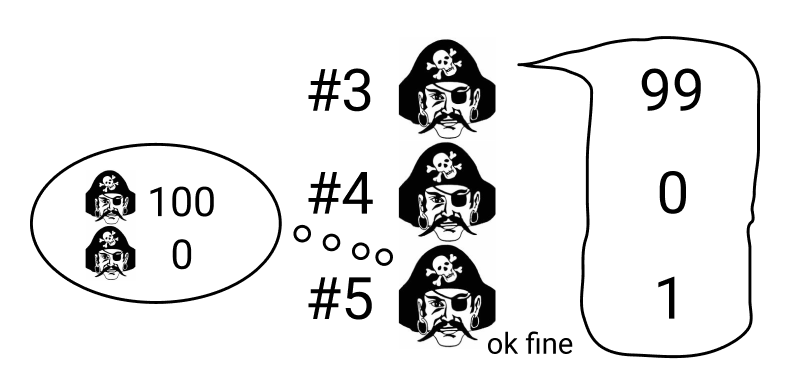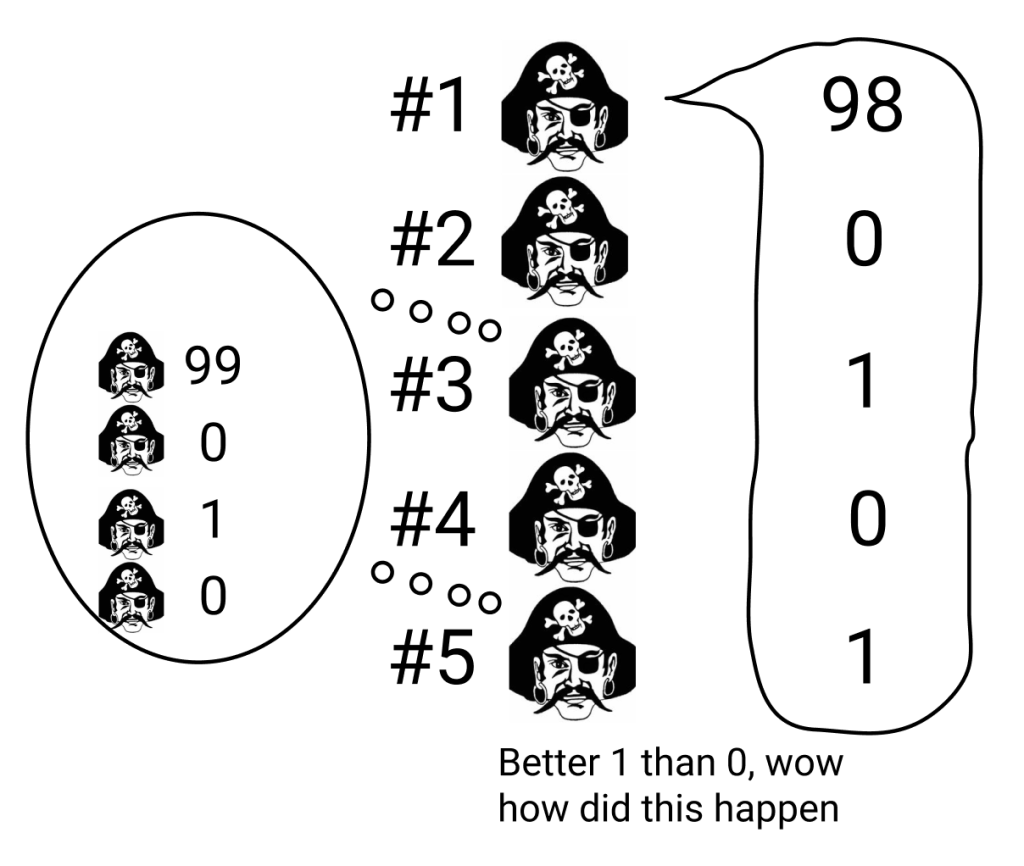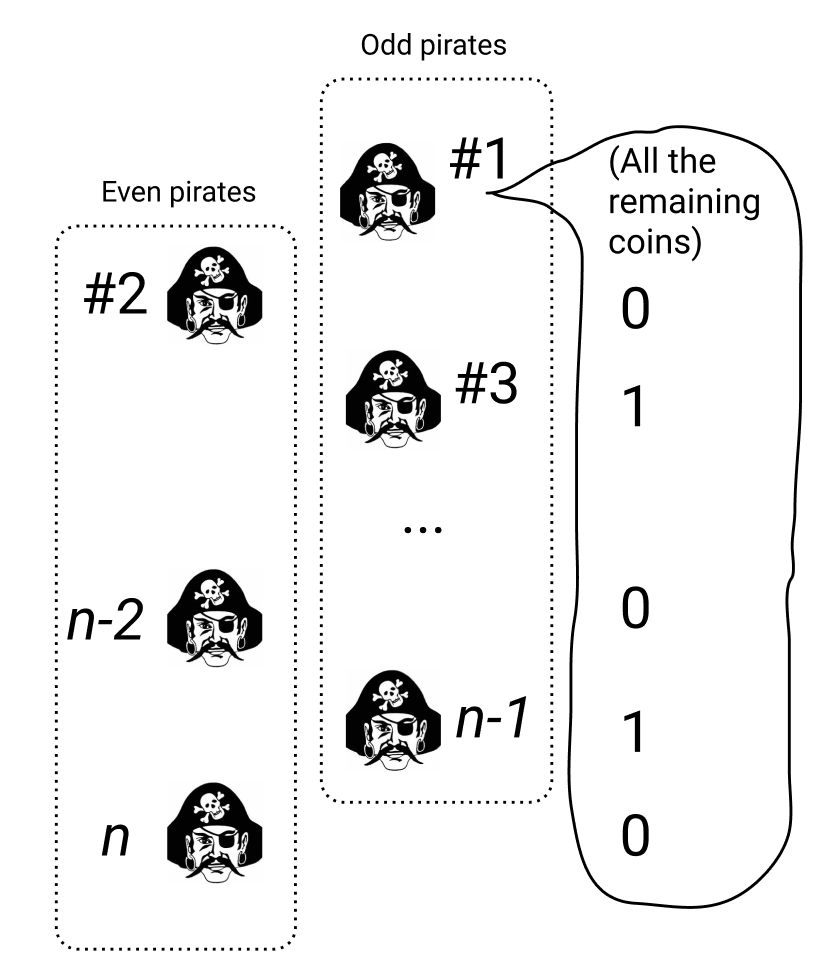

The Pirate Problem
source link: https://alexdanco.com/2021/02/02/the-pirate-problem/
Go to the source link to view the article. You can view the picture content, updated content and better typesetting reading experience. If the link is broken, please click the button below to view the snapshot at that time.
The Pirate Problem
Here is a riddle I think about quite often, and just might be of interest to the Gamespop crowd going forward:
Five pirates (who used to be hedge fund managers before they gave up their life of sin and took up an honest profession) attack and board a ship. While plundering the boat, they uncover a chest filled with 100 identical, indivisible gold coins. Before parting ways, the pirates must decide how to divide the treasure.
They commit to the following proposal scheme:
The pirates rank themselves #1 – #5, by ascending seniority. The most junior pirate, #1, goes first. He proposes a split of the treasure. The split could go any way; there are no rules aside from indivisibility of coins. (We can notate his proposal as follows: [20 – 20 – 20 – 20 – 20], or [45 – 30 – 24 – 1 – 0], for example).
Once Pirate #1 submits his proposal, all pirates vote. If a majority, or at least a tie, of the pirates vote in favour, the pirates split the treasure according to the proposal and go their separate ways. Alternately, if a clear majority votes against the proposal, Pirate #1 is thrown overboard to the sharks, and Pirate #2 presents a proposal of his own. And if that proposal fails, it goes to pirate #3, and so on.
Recall that these pirates used to run hedge funds, so they are all very smart (in this domain, anyway) and think rigorously through each proposal. Obviously, they all care more about maximizing their own treasure than about their fellow pirates. But they also abide by pirate code: if a proposal passes voting, they will honour it.
You are the most junior pirate, and you get to make the first proposal. How much treasure can you get?
(If you scroll down a little bit, I will provide some clues. If you scroll down more, I will provide the answer.)
Here are some hints:
So, you’re the first pirate. It probably feels like you have zero leverage. After all, why is it in any of pirate [2-5]’s interest to hear your proposal at all? Why shouldn’t they just vote you overboard no matter what, so that there are fewer pirates to share treasure with?
For instance, you could propose a fair split of [20 – 20 – 20 – 20 – 20]. But why should the other four go for this when, at a minimum, there are five free coins in it for them if they just get rid of you?
For that matter, why shouldn’t that be true for pirate 2 also, if pirates 3-5 have a clear majority between the three of them?
If that’s true, then you’re totally out of luck as pirate 1. You might as well accept you aren’t getting anything.
But maybe you do have leverage as the little pirate. How?
Okay, so second hints section. You’re the most junior pirate. You have to figure out if there’s some way that you can get leverage against the other pirates. How are you going to do that?
Well, who are the other pirates most afraid of?
Are they afraid of you?
If you’re Pirate #5, who are you afraid of? And who might be your friend?
And if you’re Pirate #4? Who are you afraid of, and who might be your friend?
OK, so here’s the answer: as Pirate #1, the most junior pirate, you can actually make off with 98 gold coins, out of the original 100, if you make the correct proposal. How do you pull this off?
Most people, when they approach this puzzle, start by thinking, “okay, this must be a story of the little pirates against the big pirates.” And they try to work out: how can the little, disadvantaged pirates at the beginning gain leverage over the big, senior pirates at the end, who have the voting power and can wait you out? No matter how you try, you are never going to make this work. The big pirates will beat the little pirates.
But there’s another question you can ask, which is, who are the big pirates afraid of? They’re not afraid of the little pirates. They’re afraid of the other big pirates.
Imagine there are only two pirates. (Or, in other words, the scenario where pirates 1-3 have all been thrown overboard, and only 4 and 5 are left.) What happens? Well, we know exactly what will happen. Pirate 4 will read the rules carefully, and submit his proposal: [100 – 0]. It is a certainty he will do this. No majority can vote against him; he’s got the entire treasure in the bag.
Pirate #5 does not like this scenario! He does not like it one bit. He doesn’t get thrown overboard, but he doesn’t get any treasure either. So any amount of treasure is better than this. Pirate #5 needs to make sure that it never gets down to the final two pirates. And you know who has thought this through? Pirate #3.
Pirate #3 understands that Pirate #5 is afraid of Pirate #4. If it gets down to three pirates, Pirate #3 has total leverage over Pirate #5, because any deal is better than no deal. (He has no leverage over pirate #4, but that doesn’t matter! He only needs one more vote.) So what’s Pirate 3 going to propose? [99 – 0 – 1].
You know who does not like this scenario now? Pirate #4, who needs to avoid this outcome at any cost. And you know who has thought this through? Pirate number two. Pirate #2 understands, hey, Pirate 4 will do anything to avoid this scenario coming down to only 3 pirates! So if it gets to Pirate 2’s proposal, we know what he’ll offer: [99 – 0 – 1 – 0]. And pirate 4 will have no choice but to accept one gold coin, cause it’s better than zero.
But you know who doesn’t like this scenario? Pirates 3 and 5, because now they’re getting zero coins. Somehow, the big bad pirates with the voting majority at the end have lost everything. And you know who understands this, by this point in our story? Pirate number one: you. You can make your offer: [98 – 0 – 1 – 0 – 1]. Pirates 3 and 5 have no choice but to sullenly accept one single gold coin each, because the alternative is nothing.
No matter how tiny you feel at the beginning or how many senior pirates come after you, it doesn’t matter, because they’re all more afraid of each other than they are of you. (This is a timeless and very generalizable lesson!)
Specifically, in this case, the odd-numbered pirates and the even-numbered pirates are all afraid of each other. If the even-numbered pirates gain control, the odd-numbered pirates all end up with zero coins, and vice versa. So the pirate with all the power is the very first one. (This works for any large number of coins, and any number of pirates.)
Now why am I telling you this, Gamescott enthusiasts? Because if you really want to stick it to Wall Street and to the real hedge funds, and make this mayhem a slightly more repeatable process, you need to understand why the Redditors actually have some power. It’s not because they can “overwhelm” the hedge funds on their own, or create a gang of little pirates with real leverage over the big pirates. Absolutely not.
But remember, the big hedge funds are taking the opposite sides of trades as one another. They are like the senior pirates. They’re not really thinking about you; they’re thinking about each other. This isn’t a “you versus them” scenario, it’s a them versus them scenario. Really, it always was; that’s why a short squeeze works in the first place. There’s all this pent up energy and financial aggression already loaded into the trade; if you can poke it in the right direction, you might find a lot money suddenly get behind you. Especially now that this is a story everyone knows, and follows.
So I guess my advice for the little Reddit pirates is this: do not make this a game of “we can last longer than you can, we can be dumber than you can”, and all that. It won’t work. Make this a game of, “You’re more afraid of each other than you are of us. And we know that.”
Thanks to Chris Ramesh (I think?) for originally telling me about the Pirate Problem.
Like this post? Get it in your inbox every week by signing up for my weekly newsletter, enjoyed by 20,000 people every Sunday.
Recommend
About Joyk
Aggregate valuable and interesting links.
Joyk means Joy of geeK



